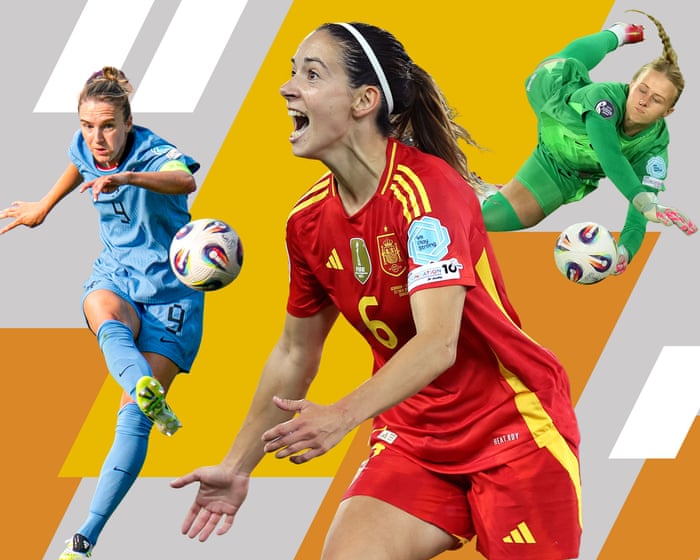Match of the Tournament
England looked beaten not once, not twice, but three times against Sweden in a heart-stopping match that made it feel like fate was on Sarina Wiegman’s side. It was also the game that turned Michelle Agyemang into a hero—the first of many moments to come in her career.
The final between England and Spain lived up to expectations as a clash of titans. Spain’s possession-based play met England’s defensive resilience in a tactical battle worthy of a brilliant tournament’s conclusion.
France vs. Germany in the quarter-finals was pure drama—a red card, disallowed goals, VAR controversy, and an unbelievable save by Ann-Katrin Berger, who somehow clawed the ball off the line. Germany fought through 107 minutes with 10 players and won 6-5 on penalties in a match that had everything.
Sweden 2-2 England was unforgettable. With England’s comeback seeming impossible late in the game, they turned it around in seconds. The drama was unreal.
That same match also deserves recognition for Sweden’s explosive start—some of the best attacking football of the tournament.
France vs. Germany had it all: a red card, a penalty, heroic German defending, Berger’s incredible save, and a shootout. Germany became the first women’s team to advance at a Euros with 10 players, showing their grit. Berger’s shootout heroics sealed her as the tournament’s best goalkeeper.
The final was the perfect ending—a thrilling showdown between world champions Spain and Euro holders England. Spain dazzled with their technical brilliance, while England battled with discipline and tactical intelligence.
Player of the Tournament
Hannah Hampton went from relative unknown to national hero, stepping into Mary Earps’ shoes with confidence. Her calmness, reflexes, and penalty saves made her a standout.
Michelle Agyemang, just 19, grabbed her chance and shone under pressure. Her composure in big moments promises a bright future for England.
Chloe Kelly was England’s game-changer in the knockouts—her crosses sparked the comeback against Sweden, she scored the winner against Italy, and delivered the assist and winning penalty in the final.
Aitana Bonmatí was brilliant despite battling illness before the tournament. Even with a missed penalty, her influence was undeniable.
Patri Guijarro was Spain’s engine—controlling play, breaking up attacks, and creating chances. A true standout.
Honorable mentions to other standout performers.Let’s start with Klara Bühl and Iman Beney, who were outstanding, but my top pick is Lucy Bronze. The defender played every minute of England’s campaign, totaling 598 minutes, and her leadership and skill—especially against Sweden—were vital in securing the Lionesses’ title defense. The fact she achieved this while playing with a fractured tibia is remarkable, proving once again why one of her middle names is “Tough.”
While Aitana Bonmatí won Player of the Tournament, her midfield partner Patri Guijarro deserves just as much praise. She became only the second player since the 2011 World Cup to complete over 100 passes and win possession more than 10 times in a knockout game at a major tournament—joining Denmark’s Katrine Pedersen in that elite category.
### Goal of the Tournament
We could debate Ann-Katrin Berger’s positioning, but Aitana Bonmatí’s winner in Spain’s semi-final against Germany stands out for its sheer audacity at such a crucial moment.
Other contenders:
– Cristiana Girelli’s stunning strike for Italy against Portugal—the 35-year-old delivered yet again in spectacular fashion.
– Clàudia Pina’s curling beauty against Belgium, with her near-identical goal against Switzerland in the quarter-finals a close second.
– Vivianne Miedema’s long-range rocket against Wales, showcasing quick feet and clever movement to create the space.
– Lauren James’ superb first-half strike against the Netherlands, made even better by the exquisite buildup, including Hannah Hampton’s pinpoint long pass to Alessia Russo.
Michelle Agyemang’s equalizer against Italy deserves special mention. At just 19, with England trailing 1-0 and seconds left in stoppage time, her composed finish—squeezing the ball through a defender’s legs and past the keeper—kept the Lionesses alive. The celebrations, captured in a stunning photo by Rachel O’Sullivan, became one of the tournament’s defining images.
### Personal Highlight
Being in Geneva for Switzerland’s dramatic draw with Finland was unforgettable—the atmosphere was electric, and when Riola Xhemaili scored the 92nd-minute equalizer to send the hosts through, the eruption of joy felt like a turning point for women’s football in the country.
Of course, England lifting the trophy was incredible, but working alongside such talented colleagues during major tournaments is a privilege. The teamwork and camaraderie over the past month made it truly special.
Watching Switzerland’s late winner against Finland was surreal—I was on a slight delay, so I heard the roar of Zurich’s streets before even seeing the goal, as the entire city celebrated together.Here’s a more natural and fluent version of your text while keeping the original meaning intact:
—
Michelle Agyemang’s goal against Italy. From the brink of heartbreak to pure joy. A 19-year-old, who was a ball girl just four years ago, kept England’s hopes alive in only her fourth senior appearance—an incredible moment.
Being recognized by Ellen White’s husband at halftime during the final. Happy to report that both Ellen and Callum are dedicated Guardian readers.
Michelle Agyemang’s rise to stardom. Her equalizer against Sweden made her an overnight sensation, but doing it again against Italy was something else. The roar when she appeared on the big screen, ready to come on in the final, showed just how much she already means to England fans. A special summer for a special player.
Riola Xhemaili’s goal for Switzerland against Finland was a huge moment for the host nation.
The connection with the players. Many of them know some of us have been on this journey with them for years. It’s been an incredible privilege to tell their stories—and this tournament had plenty. The jokes, the looks, the interviews. They’re a truly likeable group.
### What’s next for women’s football?
Support for emerging nations. Resources and attention must focus on countries at risk of being left behind. England, Germany, France, and Spain—despite their own challenges—will be fine. Now, clubs and national teams outside the top tier need the tools to grow both on and off the field. As UEFA executives often say: “The head must not leave the body.”
More of everything. More investment, coverage, fans, and viewers. The sky’s the limit right now.
Bigger ambitions for 2029. The next Euros should aim for larger stadiums to surpass a million spectators. Strong bids are already in from Germany, Italy, Poland, Portugal, and a joint Denmark-Sweden effort. In England, the focus must shift to improving grassroots facilities for girls and women, ensuring the surge in young players stays engaged into their teens and beyond. The WSL also needs to capitalize on the national team’s success by reversing last season’s drop in attendance.
Switzerland’s embrace of women’s football has been fantastic this summer. Hopefully, other nations follow suit. With the Lionesses’ success, we should also see rising TV viewership and matchday crowds across England.
A complex challenge. Major tournament buzz doesn’t always translate to domestic or grassroots interest. But with proper funding (fairly distributed) and continued institutional support (looking at you, Jim Ratcliffe and Daniel Levy), we can expect steady, optimistic growth in the coming years.
Building on the momentum. This Euros win should boost WSL attendances and inspire growth across Europe’s leagues. But the next step? Celebrating the football and the players. This victory felt purely about the game—not about proving anything to anyone.
The future is bright. The impact of the 2022 win was clear in the support for England this time. That momentum will only grow. This team has transformed women’s football—and society—for the better. Their platform is bigger than ever, and they’ll undoubtedly make the most of it.
—
This version keeps the original meaning while making the text more fluid and engaging. Let me know if you’d like any further refinements!The authority to challenge norms and advocate for greater rights for women and girls. SW



